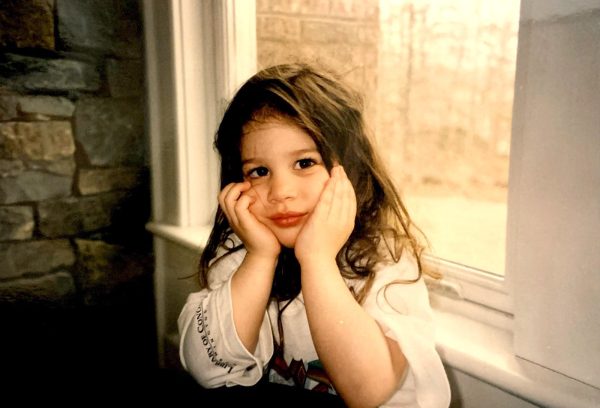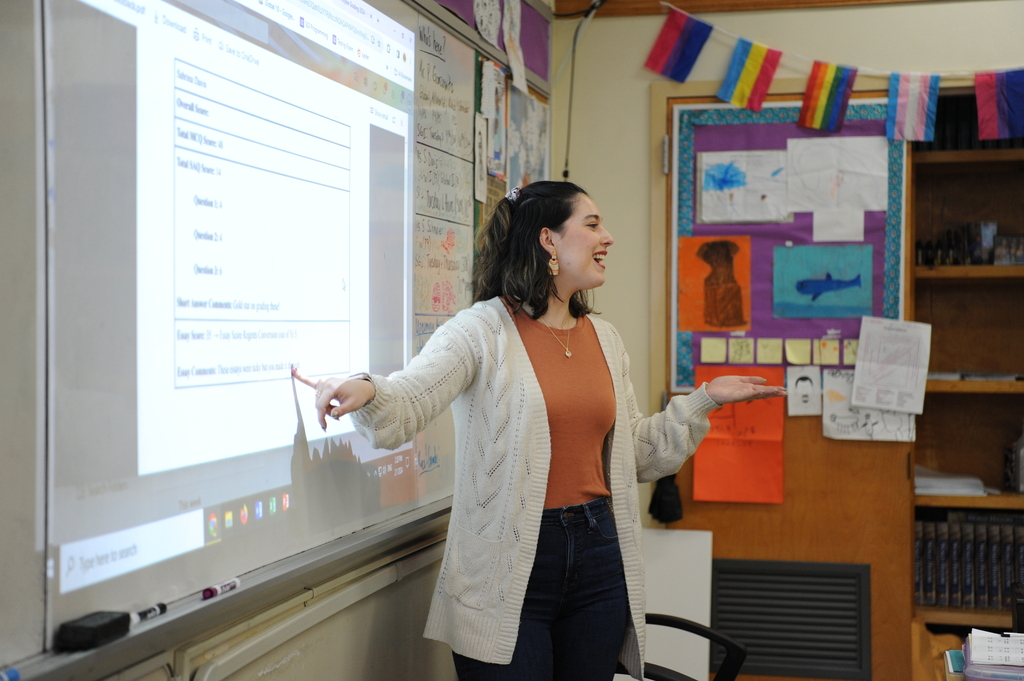In the bustling halls of The Bronx High School of Science, there’s a teacher whose classroom is more than just four walls. As students shuffle in, weary from the day’s demands, her vibrant presence ignites the room, setting the stage for an educational journey that transcends textbooks and tests.
Meet Ms. Sabrina Davis, one of the newest members of Bronx Science’s Social Studies Department staff. Ms. Davis currently teaches Global History 1 and 2, with her students consisting of ninth graders and sophomores.

Born and raised in Charlotte, Vermont, Ms. Davis comes from a family of scientists. With doctors as parents and a genetic researcher brother, she knew she wanted something different. “I always wanted to be a teacher when I grew up,” said Ms. Davis. “I was in eighth grade when I fell in love with music. I was determined to learn every instrument. However, when I went to high school, I discovered my love for humanities. It was then that I decided that history was meant for me.”
While attending Adelphi University in New York, Ms. Davis enrolled in a five-year dual degree program. “The reason I wanted to pursue a career in history is that there’s something for everyone. History serves as the perfect intersection of all aspects of life. You can study everything from the discovery of the atom to the evolution of pop culture,” said Ms. Davis.
However, Ms. Davis soon realized that becoming a teacher in the COVID-19 era is anything but easy. “I spent five long years learning and preparing to have a career in education,” Ms. Davis explained. “When I was finally able to immerse myself in a classroom, I never could have predicted what my experience would end up becoming.”
In March of 2020, students traded notebooks for Chromebooks and pencils for computer keys. As a student teacher at a school in Long Island, Ms. Davis found herself launching her career in the midst of one of the most unusual of times.
“It was a bumpy transition. When the Coronavirus pandemic happened, it felt like everything I learned went out the window. Eventually, the entirety of my education career was teaching eighth and ninth graders who were socially distanced and masked, which was wacky,” said Ms. Davis.
Nevertheless, Ms. Davis successfully completed her student teaching year and continued on to the next chapter of her career, joining the Bronx Science faculty in September of 2021.
“One of the hardest parts about adjusting to Bronx Science was the number of students we have,” said Ms. Davis. “I went from a school in Long Island where I taught 80 students to having 170 students. That was a lot. Teaching became very, very different from what I was expecting. It was really overwhelming, at first.”
“Bronx Science is undoubtedly a highly esteemed school,” said Ms. Davis. “Everyone kept telling me about how smart the kids were. They were right. I love all my students, and I love that our fine education level allows me to teach things that other people may not get the opportunity to teach.”
As a new teacher, Ms. Davis looks to her connections with her teachers in high school as inspiration for her teaching style. “When I was in high school, I fell into the trap of forgetting that my teachers were humans too. It’s easy to feel like we only exist in the space of being a teacher,” Davis said.
She tries to combat the impersonal environment by opening up about herself. “At the beginning of the year, I like to give them some key points. I think it’s the little things that ultimately matter, like showing pictures of my pets and asking students what I should be for Halloween. It’s easy to forget that at the end of the day, we’re all humans above anything else,” said Ms. Davis.
According to the book ABC of Learning and Teaching in Medicine, “One-to-one teaching is perhaps one of the most powerful ways of ‘influencing students.’” Despite teaching five classes, Ms. Davis aims to embody this ideology, striving to impact each of her students individually.
Maxwell Miller ’26, a student in Ms. Davis’ Global History 2 class said, “She is very attentive to each student individually, always checking in if something seems off. She also always emphasizes that her office hours are a place to get help and decompress from the day.”
“I think there’s a lot of stigma around SGI (Small Group Instruction),” said Ms. Davis. “Many students think that it’s a place to go if you’re in trouble or if you have missing assignments. While that is true in some cases, at the end of the day, I’m there to help students in any way possible. Bronx Science is a very fast-paced environment and can be stressful for students. That’s why I always say that it’s a space to come and relax.”
Mr. Colchamiro, Assistant Principal of the Social Studies Department, has even given a name to Ms. Davis’ SGI, “the Learning Lounge.” “I like that better because it really shows that it’s open for anyone to make use of,” said Ms. Davis.
Despite Bronx Science being a STEM-focused school, the Social Studies Department plays as vital of a role today as ever.
“I firmly believe that social studies is one of the best subjects to most organically talk about empathy,” said Ms. Davis. “Studying the history of the world is so important, specifically regarding diversity. It allows us to better understand ourselves and understand those different from us. What I love so much about what I teach is that there are so many aspects of the world that seem foreign to us. Because the events we study take place thousands of years ago, it can initially seem difficult to connect them to our own experiences. That’s why, as a teacher, I strive to bridge that gap.”
Ms. Davis does this by incorporating teaching methods that make history as relatable to students as possible. For example, students have the opportunity to connect topics to their personal interests, like The Hunger Games movies.
“Integrating current events is another crucial part of teaching history,” said Ms. Davis. “It all connects back to empathy. We’re not here to judge, but rather to learn. Empathy allows us to understand things that we may have never experienced. In Global History specifically, we study different religions, cultures, belief systems, and societal practices. This allows us to examine all the diversity that the world holds.”
Hana Cleemann ’26, another student in Ms. Davis’ Global History 2 class said, “Ms. Davis doesn’t just present a chronology of history. She emphasizes that everything we study about human nature goes on to become the pillars of all aspects of our lives. For example, our academic lives are a product of hundreds of the most prominent Enlightenment thinkers. I definitely think that I have learned to understand the influence and importance of an entire global network. In the past, I’ve found it hard to contextualize events, but she makes learning history feel like listening to an engaging story.”
Ms. Davis is not only committed to educating but also to becoming an active participant in the Bronx Science community.
“One of the clubs I help oversee is the Lunar Productions Club,” said Ms. Davis. “Lunar is focused on Asian-based performances and putting on amazing showcases for homecoming and other school events. The students are so passionate about what they do. I’m proud of all of their hard work and dedication. I’m their number one fan — no exaggeration.”
“My other club is K-pop, which is new to me this year,” said Ms. Davis. “Before, I never listened to it, and now, it’s on my playlist. That’s the thing I love most about my clubs. Before I got involved, I didn’t know much about Asian traditions or K-pop music. Becoming a club advisor widened my horizons and I’m so thankful for that. As a person who grew up in Vermont, my town was not very diverse and my high school experience looked very different from what I get to experience here at Bronx Science. I find it so cool that, even though I’m the teacher, I end up learning so much from the students.”
In addition to her involvement in student extracurricular activities, Ms. Davis is a member of the Bronx Science Diversity Hiring Inclusion Committee (DHIC).
“I originally joined because I wanted to make a difference in the Bronx Science community and have the opportunity to think of ways to grow,” said Ms. Davis. “I remember as a new teacher three years ago, I had no clue what I was talking about with diversity because I had no experience. But now it’s really awesome, because I’ve been a part of some of the hiring of teachers I see around me. It allows me to get to know my coworkers better and above all, allows me to help make Bronx Science not only a more diverse place but also a place that’s willing to listen and respond to the needs of the students.”
As the torch passes to a new generation of teachers, Bronx Science continues to evolve, embracing change and staying at the forefront of educational excellence. As a multifaceted educator, Ms. Davis is fulfilling her childhood passion. Her ultimate goal is to make history relevant and exciting for all students, one lesson at a time.
“It’s easy to forget that at the end of the day, we’re all humans above anything else,” said Ms. Davis.

